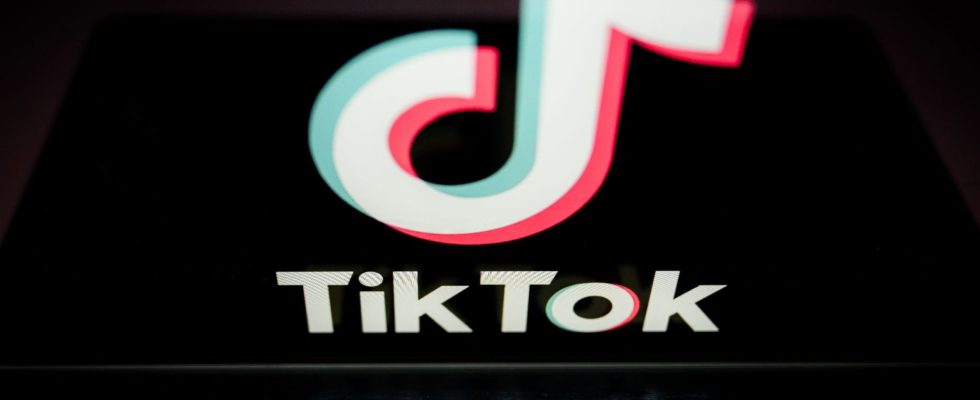The social network has been in the crosshairs of the American authorities for several months. The threat of a ban on TikTok becomes clearer this Thursday, March 14 in the United States, the day after the adoption by the American House of Representatives of a bill which asks the platform to cut ties with China . This is a major development for the social network, even if the outcome of the upcoming vote in the Senate remains uncertain.
The bill, adopted by a large majority of 352 votes out of 432 elected representatives in the US House of Representatives, would require ByteDance, the parent company of TikTok, to sell the application within 180 days, failing which it would be excluded Apple and Google application stores in the United States. The law “does not ban TikTok,” said the leader of the Democrats in the House of Representatives, Hakeem Jeffries. “It aims to resolve legitimate national security and data protection issues related to the Chinese Communist Party’s relationship with a social network,” he explained.
China quickly responded, denouncing a decision “contrary to the principle of competition”. “If a so-called pretext of national security can be used to arbitrarily exclude successful companies from other countries, then there is no more fairness and justice,” said Wang Wenbin, a spokesperson for the ministry. of Foreign Affairs, adding: “When someone sees a good thing from another person and wants to take it from them, these are absolutely thug methods.”
In Montana, the ban reversed
Many officials believe that the short, entertaining video platform allows Beijing to spy on and manipulate its 150 million users in the United States. The company, for its part, has always denied these accusations. Several states and the federal government have banned use of the app on official government devices, citing national security risks.
In Montana, a northwestern state, a federal court in November 2023 blocked a law passed in May 2023 by the state government to completely ban the app, on the grounds that it violated constitutional rights regarding freedom of expression. Although the application continues to be under Washington’s surveillance, no federal measures to ban or restrict the use of the social network no longer appear to be considered at this time.
The ban in India, a big loss for TikTok
Around the world, several countries have banned TikTok in recent years. In June 2020, TikTok, as well as dozens of Chinese applications, was banned in India, after deadly clashes on the border with China between the Indian and Chinese armies over a border dispute in the Himalayas. The ban became permanent in January 2021.
The blockage was a major setback for TikTok, which is extremely popular with young Indians. Forbes reported that TikTok had some 150 million monthly active users there, its largest foreign market at the time. As stated International mailthe ban benefited other TikTok competitors, starting with Meta, while applications made in India were born like Josh, Moj or even Chingari.
In recent years, Pakistani authorities have temporarily banned TikTok on several occasions before reversing their decision. In a case dating back to 2021, a court blocked the app after receiving complaints of “immoral and indecent content”, reported Associated Press, noting that the blockage was lifted less than a month later. Most recently, as reported in February 2024 the Washington Post, TikTok played a key role in the country’s shock election result, with Imran Khan’s party using the app to reach millions of illiterate voters who do not use Facebook and other text-intensive platforms .
Also in Asia, Nepal announced a ban on TikTok in November 2023. The country’s Minister of Communications and Information Technology said the app has “been systematically used to share content that disrupts harmony social”. In 2022, the Taliban announced the ban on TikTok in Afghanistan in order to “prevent the younger generation from being misled”. reports the BBC. The ban went into effect, but users have found ways to get around the restrictions through the use of VPNs, according to a report from Wired.
TikTok banned from Western leaders’ phones
In February 2023, the European Commission announced a ban on the downloading and use of TikTok on their employees’ professional devices. This measure also applied to personal telephones connected to the Commission’s mobile network. This ban on TikTok was quickly extended to other EU institutions, the European Council and Parliament, the Council of the EU and the European Court of Auditors.
Canada also banned TikTok from all government phones in February 2023, after similar measures in the United States and the European Union. The Canadian government’s decision stemmed from a review of the app, which “presents an unacceptable level of risk to privacy and security.” In March 2023, the British Parliament also announced a ban on TikTok on all its devices and network, following in the footsteps of a measure taken a week earlier by the British government.
Also in March 2023, lawmakers agreed to ban TikTok on mobile devices with access to the New Zealand Parliamentary Network. Officials cited cybersecurity concerns, relates the Washington Post. Australia also banned TikTok from all federal government-owned devices, in April 2023, after seeking advice from intelligence and security agencies. Before these decisions, Taiwan had once again banned TikTok on government devices in 2022. According to Taiwanese media, the authorities of this island territory over which Beijing claims sovereignty invoked national cybersecurity to justify this decision.
